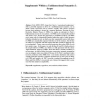Free Online Productivity Tools
i2Speak
i2Symbol
i2OCR
iTex2Img
iWeb2Print
iWeb2Shot
i2Type
iPdf2Split
iPdf2Merge
i2Bopomofo
i2Arabic
i2Style
i2Image
i2PDF
iLatex2Rtf
Sci2ools
136
click to vote
AMSTERDAM
2009
2009
Supplements within a Unidimensional Semantics I: Scope
Potts (2005, 2007) claims that Grice's `conventional implicatures' offer a powerful argument in favor of a multidimensional semantics, one in which certain expressions fail to interact scopally with various operators because their meaning is located in a separate dimension. Focusing on NonRestrictive Relative Clauses (= NRRs), we explore an alternative to Potts's bidimensional account. In our analysis, (1) NRRs can be syntactically attached with matrix scope, despite their appearance in embedded positions; (2) NRRs can in some cases be syntactically attached within the scope of other operators (whether attitudinal or not), in which case they semantically interact with them; (3) NRRs are semantically conjoined with the rest of the sentence, but (4) they are subject to a pragmatic rule that requires that their content be relatively easy to accommodate
| Added | 16 Feb 2011 |
| Updated | 16 Feb 2011 |
| Type | Journal |
| Year | 2009 |
| Where | AMSTERDAM |
| Authors | Philippe Schlenker |
Comments (0)

